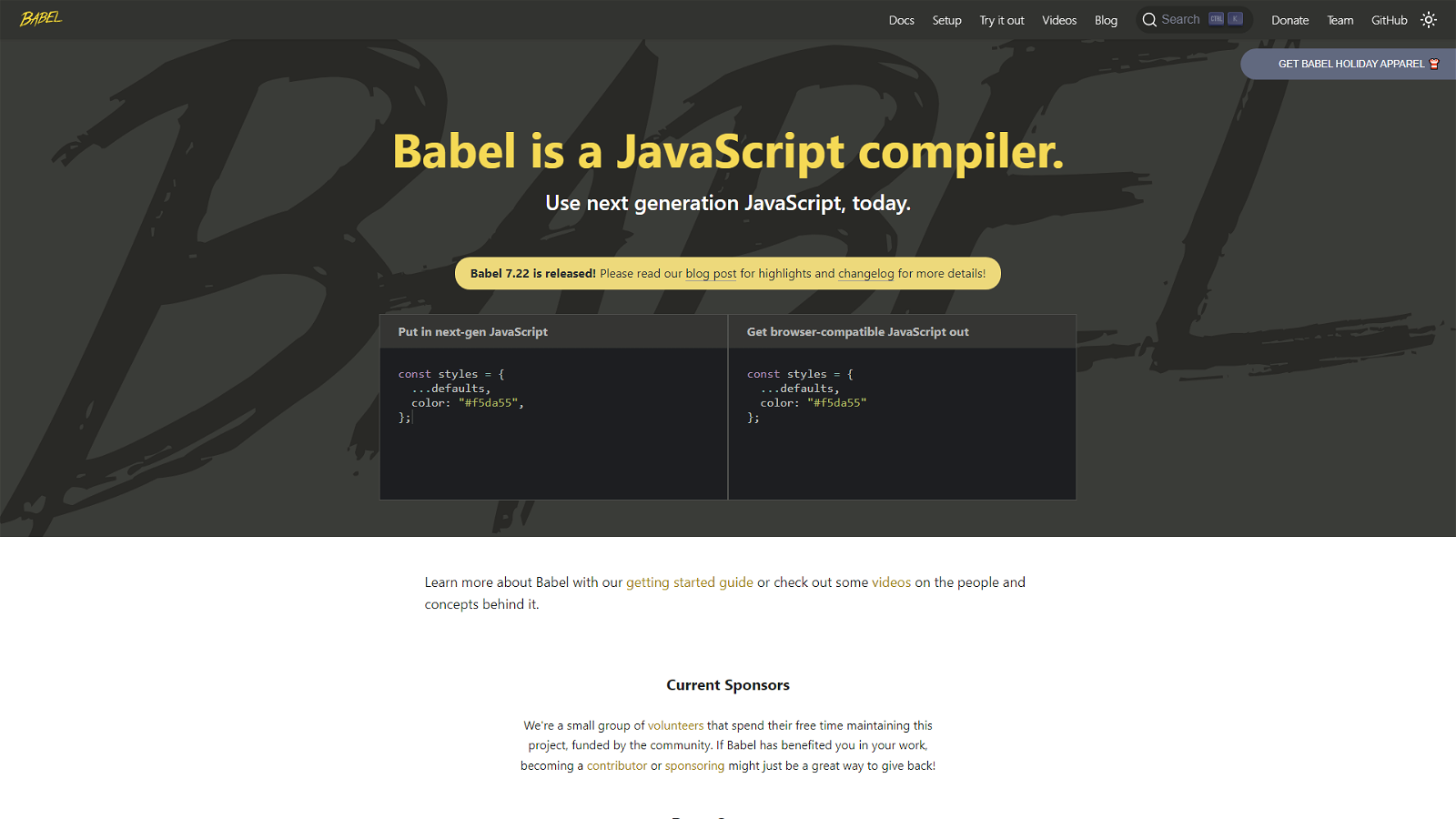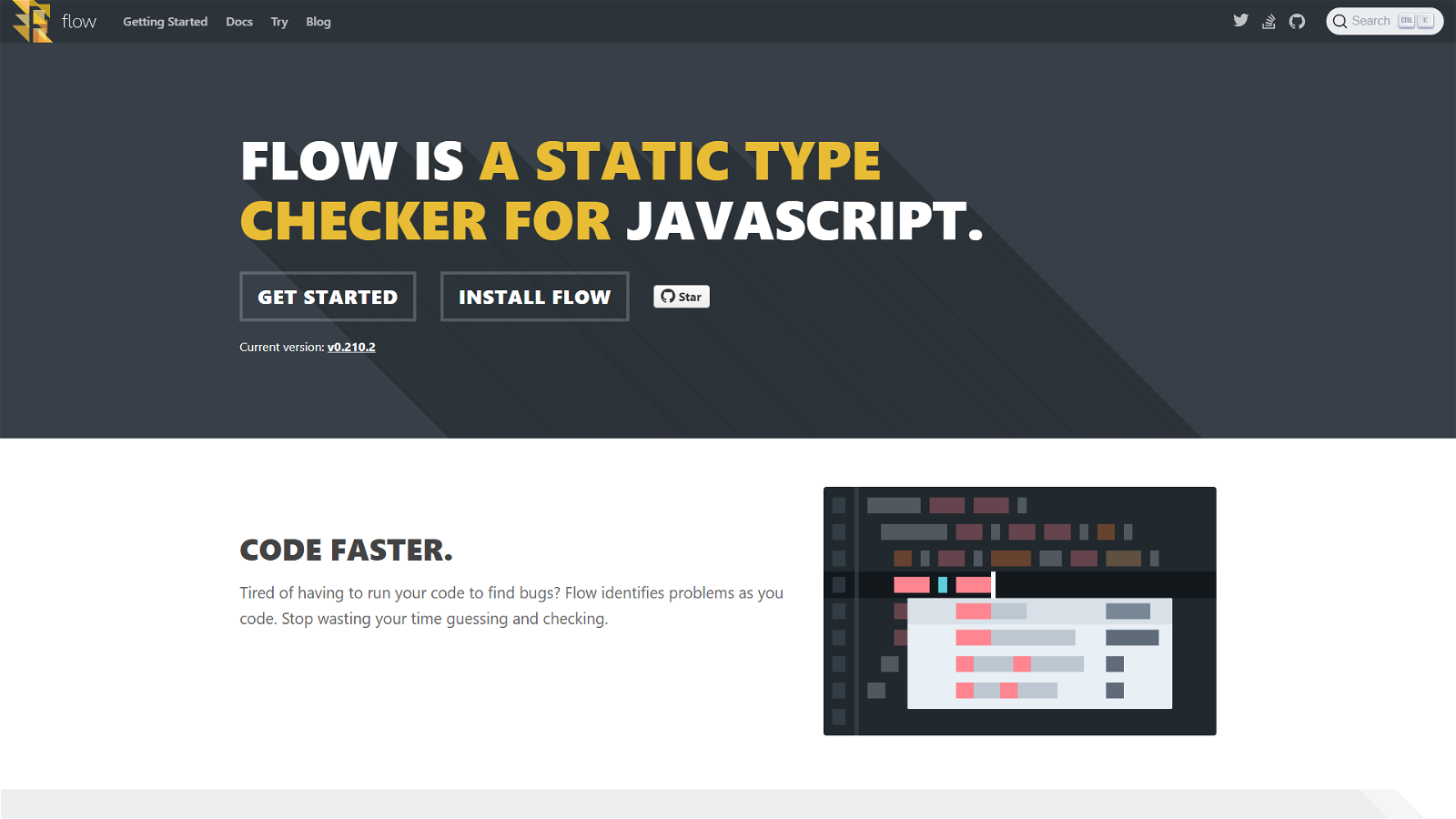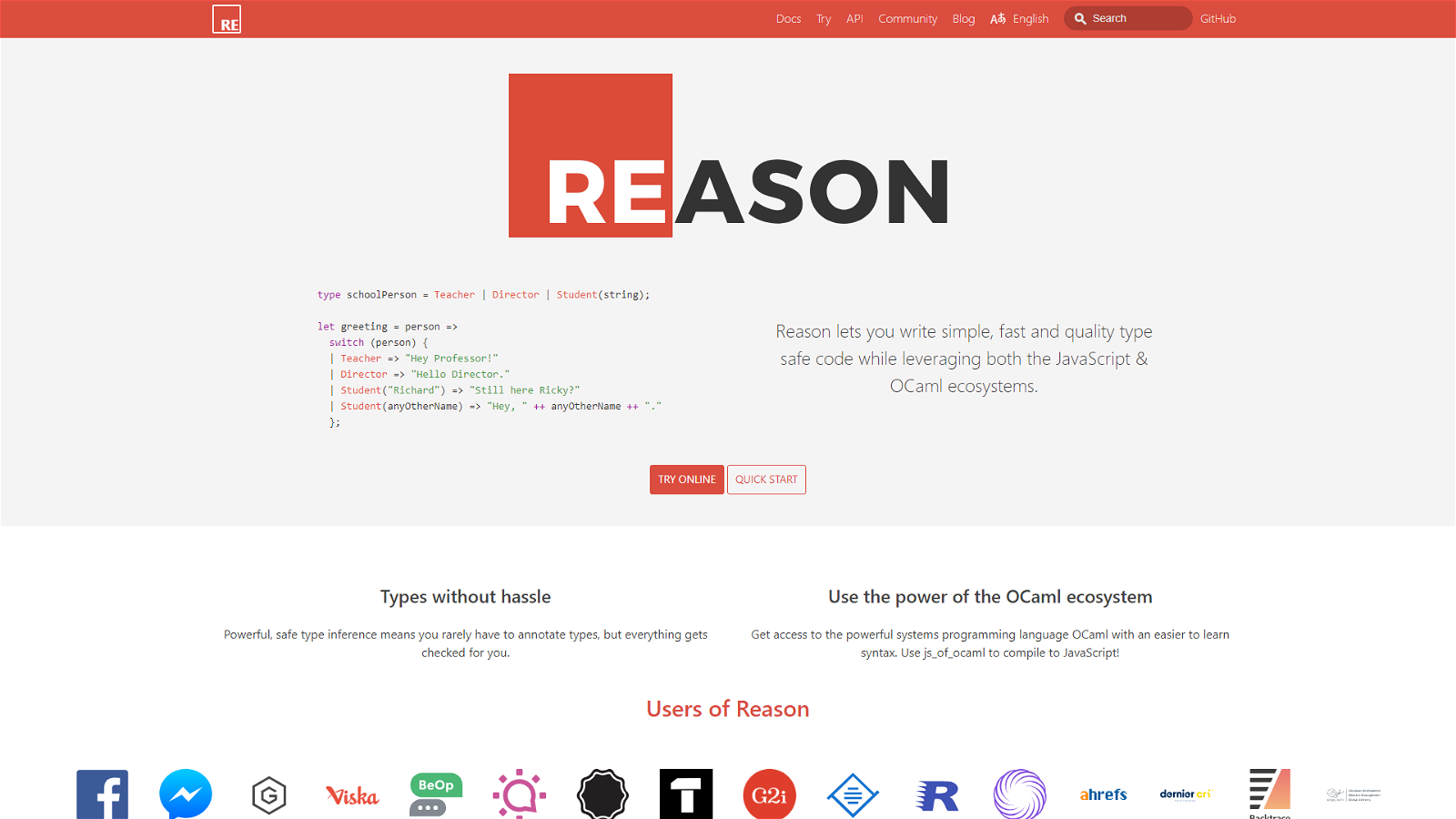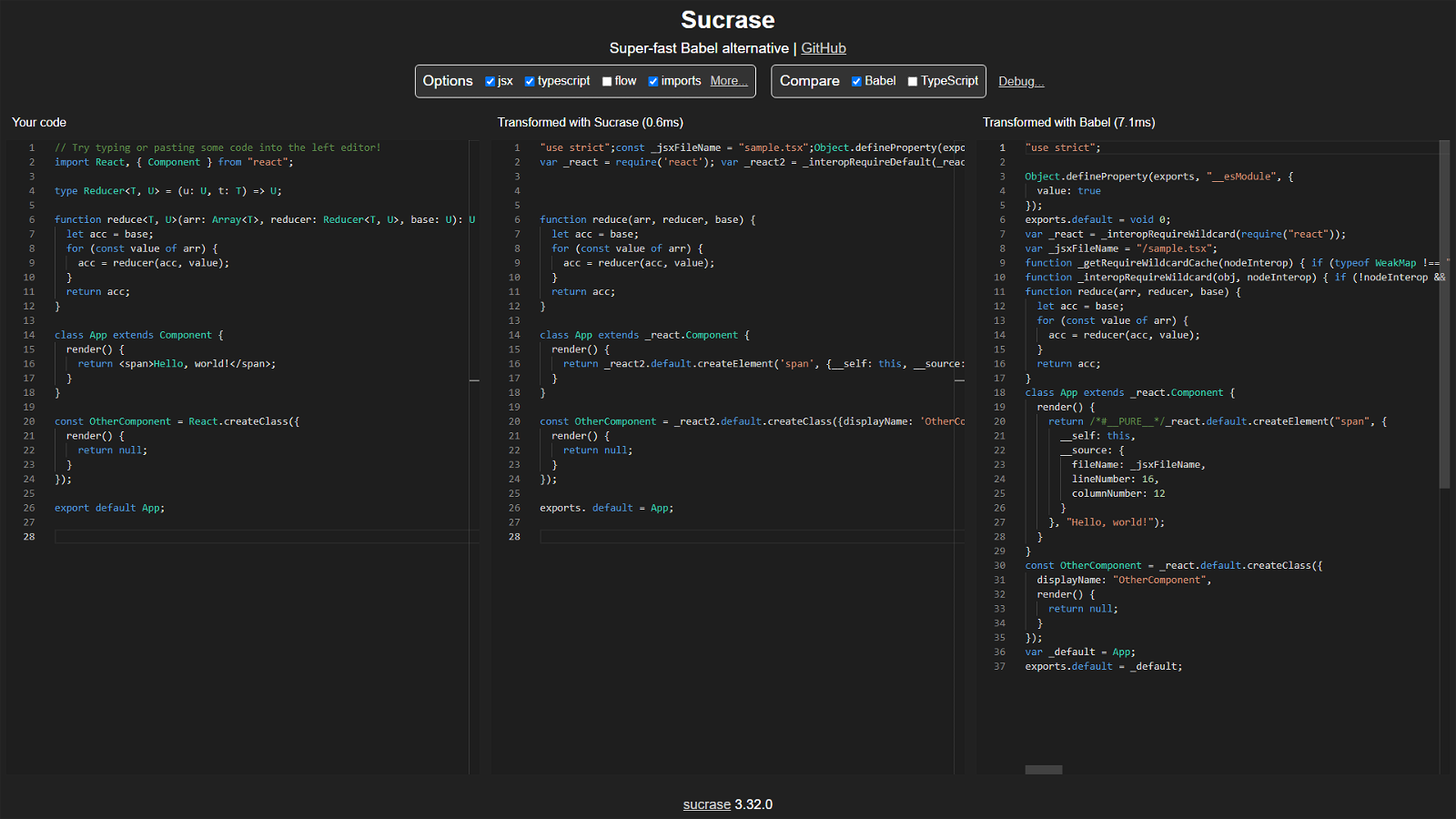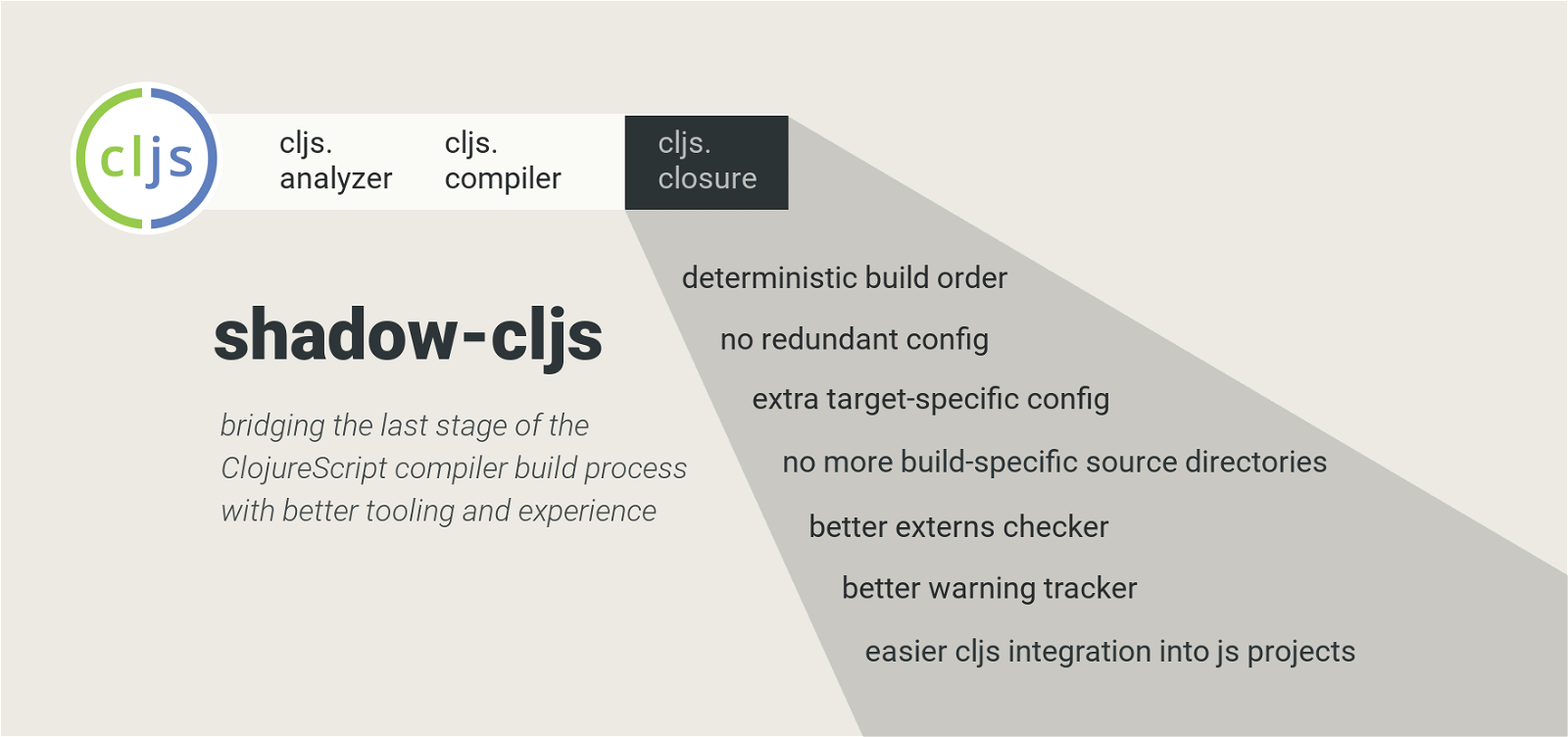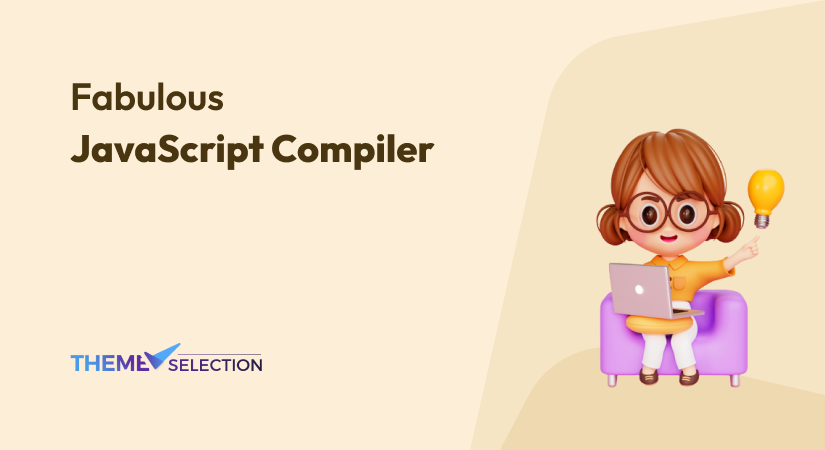
Looking for the best JavaScript Compiler? Then check out this comprehensive list of the best compilers for JavaScript. With the help of JavaScript Compiler, you can boost your workflow with ease. Before we start the list, let’s check what a compiler is and what are the benefits of using one.
Table of contents
What Is JavaScript Compiler?
A compiler is a software program that translates source code written in a high-level programming language into a lower-level language, typically machine code or bytecode, which you can directly execute through a computer. It performs various tasks, including lexical analysis, syntax analysis, optimization, and code generation, to produce an executable program.
JavaScript is an interpreted programming language, meaning that it is executed by an interpreter directly without a separate compilation step. However, modern JavaScript engines also include a just-in-time (JIT) compiler that optimizes and compiles parts of the JavaScript code at runtime. Besides, this compiler analyzes the JavaScript code, performs optimizations, and generates efficient machine code that can execute directly by the underlying hardware.
The JavaScript compiler operates in stages. Initially, it interprets the JavaScript code to quickly execute it. As the code is executed repeatedly or based on certain heuristics, the compiler identifies hotspots or frequently executed code portions. Thereafter, these hotspots are then compiled into highly optimized machine code, resulting in significant performance improvements.
This combination of interpretation and dynamic compilation allows JavaScript to balance between quick startup times and optimized execution speed, providing a flexible and efficient runtime environment for web applications. Here we will get to know about the best JavaScript compilers.
Advantages of Using Compilers:
- Improved Performance
- Portability
- Code Optimization
- Enhanced Security
- Language Independence
- Error Checking
- Standalone Executables
- Better Resource Utilization
You can also consider Javascript-based Admin Template to boost your development workflow. For instance, check our latest Materio Bootstrap 5 HTML Admin Template. It is based on JavaScript and uses the latest Bootstrap 5. You can develop any kind of web app using this Bootstrap admin template with ease.
Features:
- 5 Dashboards
- 10 Pre-built Apps
- RTL & Multilingual Support
- 6 Unique Layouts including Light & Dark Theme
- SASS Powered
- Unlimited Color Options
- Authentication Pages and much more.
Parameters of Choosing The Best Compilers
Following are some of the parameters to choose the best JavaScript Compilers:
- Compatibility: Ensure that the compiler supports the programming language and platform you are working with.
- Performance: Consider the compiler’s ability to optimize code and generate efficient machine code for faster execution.
- Language Features: Look for a compiler that supports the desired language features and standards to maximize development capabilities.
- Error Reporting: Evaluate the compiler’s ability to provide detailed and accurate error messages for easier debugging.
- Community and Support: Consider the availability of resources, documentation, and community support for the compiler.
- Integration: Assess how well the compiler integrates with existing development tools, libraries, and frameworks.
- Scalability: Consider the compiler’s ability to handle larger codebases and projects as they grow in size and complexity.
- Portability: Check if the compiler can generate code that you can execute across multiple platforms and architectures.
- Development Workflow: Consider how the compiler fits into your development workflow and if it supports necessary build and deployment processes.
- Licensing and Cost: Evaluate the licensing terms and cost associated with the compiler, considering both commercial and open-source options.
Now, let’s check the list of the best Compilers for JavaScript.
The Best JavaScript Compilers:
Here in this list, we have gathered some of the best JavaScript Compilers.
Babel
Babel is one of the most popular JavaScript compilers. It enables developers to write modern JavaScript code using the latest language features while ensuring compatibility with older environments. Besides, it operates as a transpiler, transforming newer JavaScript syntax into equivalent code that can run on older browsers and platforms.
Babel’s primary purpose is to bridge the gap between cutting-edge language features and the need for backward compatibility. One of the key advantages of Babel is its extensive plugin ecosystem. Developers can customize Babel’s behavior by adding or configuring plugins, allowing them to tailor the compilation process to their specific needs.
Besides, these plugins enable tasks such as transforming arrow functions, template literals, and modules, among many others. Furthermore, With Babel, developers have the flexibility to leverage modern JavaScript capabilities without sacrificing support for older environments, making it a valuable tool in the JavaScript ecosystem.
Features:
- JavaScript transpiler for backward compatibility
- Supports the latest language features and syntax
- Converts modern JavaScript code into equivalent older versions
- Extensive plugin ecosystem for customization
- Enables developers to write cutting-edge code while maintaining compatibility
- Flexible configuration options
- Transforms arrow functions, template literals, and modules, among others
- Widely used and highly regarded in the JavaScript community
- Facilitates smooth integration of modern JavaScript capabilities in older environments
Babel is a toolchain that is mainly used to convert ECMAScript 2015+ code into a backward-compatible version of JavaScript in current and older browsers or environments.
When Should You Use Babel?
Babel is commonly used when developing JavaScript applications that need to support different environments or versions of JavaScript. It is particularly useful when working with modern JavaScript features that may not be supported by all browsers or runtime environments.
Furthermore, Babel enables developers to write code using the latest syntax and language features, while automatically transforming it into a compatible format that can run in target environments. By using Babel, developers can ensure cross-browser compatibility and improve code maintainability without sacrificing the use of modern JavaScript features.
Check the official Github Repo for further details.
SWC
SWC (Speedy Web Compiler) is a powerful JavaScript compiler that aims to provide fast and efficient code transformation for JavaScript and TypeScript. Furthermore, It stands out for its exceptional performance, making it one of the fastest compilers available in the JavaScript ecosystem. Besides, SWC achieves its speed by utilizing a combination of parsing and analysis techniques that optimize the compilation process.
One of the notable features of SWC is its wide compatibility with various JavaScript frameworks and tooling. Additionally, it also supports popular frameworks like React, Angular, and Vue.js, allowing developers to seamlessly integrate SWC into their existing projects.
Additionally, you can also use SWC as a standalone tool or as a plugin within popular build tools like Webpack and Babel. This flexibility makes SWC a versatile choice for optimizing JavaScript and TypeScript code, improving overall development efficiency. Therefore, it is one of the best JavaScript Compilers.
Features:
- Fast and efficient compilation
- Comprehensive code transformation for JavaScript and TypeScript
- Compatibility with popular frameworks like React, Angular, and Vue.js
- Standalone usage or integration with build tools like Webpack and Babel
- Support for the latest language features and syntax
- Customizable compilation options
SWC is an extensible Rust-based platform for the next generation of fast developer tools. It’s used by tools like Next.js, Parcel, and Deno, as well as companies like Vercel, ByteDance, Tencent, Shopify, and more. SWC can be used for both compilation and bundling.
When Should You Use SWC?
SWC is particularly beneficial in scenarios where performance and efficiency are critical, such as in large-scale applications or performance-sensitive environments. SWC leverages the speed and efficiency of WebAssembly to compile and optimize JavaScript code, resulting in significant performance improvements. By utilizing SWC, developers can achieve faster load times, reduced bundle sizes, and overall enhanced runtime performance, making it an ideal choice for projects that prioritize speed and optimization.
Check the official Github Repo for further details.
Flow 22k
Flow is a JavaScript compiler that specializes in type checking and static analysis. As a static type checker, it also enables developers to add type annotations to their JavaScript code and catch potential type errors during the compilation process. Besides, by analyzing the codebase and detecting type inconsistencies, Flow helps identify common programming mistakes and enhances code quality.
One of the primary use cases of Flow is gradual typing. Developers can incrementally introduce type annotations to their existing JavaScript codebase, allowing them to leverage the benefits of static typing without the need for a complete rewrite. Thus, this approach provides an opportunity to enhance code reliability and maintainability over time. Therefore, it is one of the best JavaScript Compilers.
Flow works with:
- macOS (x86_64)
- Linux (x86_64 and arm64)
- Windows (x86_64, Windows 10 recommended)
Features:
- Static type checking for JavaScript
- Allows adding type annotations to catch potential type errors
- Enhances code quality and reliability
- Supports gradual typing for existing JavaScript codebases
- Seamless integration into the JavaScript development workflow
- Provides tooling support, including editor plugins and build system integrations
- Helps catch errors early and improve code robustness
- Flow gives you fast feedback
TypeScript and Flow are both static type checkers for JavaScript, but they have some differences. TypeScript is a superset of JavaScript, meaning it includes all JavaScript syntax and features while adding static typing. Flow, on the other hand, is a separate static type checker that requires annotations to type JavaScript code. TypeScript has a larger user base and better tooling support, while Flow offers more flexible type inference and is known for its incremental adoption capabilities.
When Should You Use Flow?
Flow can be very useful in large codebases or projects with multiple developers, where maintaining type safety becomes crucial. Besides, it enables developers to annotate their code with type information and performs type checks during compilation, allowing for the detection of potential errors and providing valuable feedback. Additionally, Flow helps developers to improve code reliability, enhance documentation, and facilitate collaboration within a team. This ultimately leads to more robust and maintainable JavaScript code.
Check the official Github Repo for further details.
In case you are working with AI Projects, refer to the best Javascript Machine Learning Library to boost your workflow
CoffeeScript
CoffeeScript is a programming language that compiles JavaScript, offering developers a more readable and expressive syntax. It simplifies JavaScript development by reducing boilerplate code and providing features such as class definitions and comprehensions.
By writing code in CoffeeScript and compiling it into JavaScript, developers ensure compatibility with all JavaScript runtimes and browsers. Besides, this seamless integration allows for a gradual adoption process, where CoffeeScript files can coexist with traditional JavaScript files in existing projects. Therefore, it is one of the best JavaScript Compilers.
Furthermore, this JavaScript compiler enhances code readability, reduces cognitive load, and serves as a bridge between its syntax and the widely supported JavaScript language. By using CoffeeScript’s compilation capabilities, developers can take advantage of its expressive features while seamlessly integrating with the larger JavaScript ecosystem, ultimately enhancing the quality and efficiency of JavaScript development.
Features:
- Compiles into JavaScript
- Offers a more readable and expressive syntax
- Simplifies JavaScript development by reducing boilerplate code
- Provides features like class definitions and comprehension
- Ensures compatibility with all JavaScript runtimes and browsers
- Seamless integration with existing JavaScript projects
- Enhances code readability and reduces cognitive load
- Bridges the gap between CoffeeScript syntax and JavaScript
- Improves productivity and code maintainability
When Should You Use Coffee Script?
CoffeeScript is a programming language that compiles JavaScript. It is often used when developers prefer a cleaner and more concise syntax for writing JavaScript code. CoffeeScript reduces the verbosity of JavaScript and provides syntactic sugar, making the code easier to read and write.
Besides, it is also suitable for projects where developer productivity and code aesthetics are prioritized. However, it is important to note that CoffeeScript has lost some popularity in recent years, and developers may want to consider the current trends and support for the language before deciding to use it in a new project.
Check the official Github Repo for further details.
Reason
The next one in this list of Javascript compilers is Reason. It is a programming language that compiles JavaScript, offering a sound-type system and a familiar syntax. Besides, it seamlessly combines functional programming principles with the JavaScript ecosystem, promoting safety and reliability through static type checking. With Reason, common programming errors can be caught before runtime, enhancing code quality and reducing bugs.
One of the notable advantages of Reason is its compatibility with existing JavaScript codebases. Developers can also gradually introduce Reason modules into their JavaScript projects, allowing for a smooth adoption process. Furthermore, this JavaScript compiler efficiently translates Reason code to optimized JavaScript, ensuring high performance while leveraging the benefits of static typing.
Additionally, Reason benefits from its close association with the OCaml programming language, inheriting features like strong type inference, pattern matching, and a powerful module system. This combination makes Reason a compelling choice for developers seeking a robust and safe language for JavaScript compilation. Therefore, it is one of the best JavaScript Compilers.
Features:
- Compiles to JavaScript
- Sound type system
- Familiar syntax
- Promotes safety and reliability
- Static type checking
- Compatibility with existing JavaScript codebases
- Seamless adoption and integration
- Efficient and optimized JavaScript output
- Inherits features from the OCaml programming language
Check the official Github Repo for further details.
When Should You Use Reason?
ReasonML is a statically typed programming language that compiles JavaScript. It is particularly useful when developing complex and robust applications that require strong type safety and functional programming features.
ReasonML’s static type system helps catch errors at compile-time, leading to more reliable and maintainable code. It also offers seamless interoperability with JavaScript, making it a suitable choice for projects that require integration with existing JavaScript codebases. Talking about seamless workflow, JavaScript Monorepo tools can be also helpful.
Clojurescript 9k
ClojureScript is a powerful JavaScript compiler that allows developers to write code in Clojure, a dialect of Lisp, and have it seamlessly compile into JavaScript. It brings the expressive and functional programming capabilities of Clojure to the JavaScript ecosystem. ClojureScript focuses on simplicity, immutability, and functional programming principles, enabling developers to build robust and scalable applications.
Additionally, this compiler for JavaScript also offers seamless interoperation with JavaScript. Moreover, it also provides seamless access to the vast JavaScript ecosystem, allowing developers to leverage existing JavaScript libraries and frameworks. Therefore, it is one of the best JavaScript Compilers.
Furthermore, the ClojureScript compiler generates efficient and optimized JavaScript code, ensuring high-performance execution. With its concise syntax, immutability by default, and powerful functional programming constructs, ClojureScript offers a unique approach to JavaScript development, enabling developers to write elegant and maintainable code.
Features:
- Compiles Clojure code into JavaScript
- Brings expressive and functional programming to JavaScript
- Emphasizes simplicity, immutability, and applicable programming principles
- Seamless interoperation with the JavaScript ecosystem
- Access to existing JavaScript libraries and frameworks
- Generates efficient and optimized JavaScript code
- Concise syntax and powerful functional programming constructs
- Enables elegant and maintainable code development
When Should You Use Clojurescript?
ClojureScript is a dialect of the Lisp programming language that compiles to JavaScript. It is a suitable choice when developing web applications that prioritize functional programming, immutability, and rapid development. ClojureScript’s emphasis on immutable data structures and pure functions promotes code that is easier to reason about and test. Additionally, its dynamic nature and interactive development workflow facilitate rapid prototyping and iterative development.
Purescript 8.2k
Purescript is a powerful JavaScript compiler that offers a functional programming language designed for creating highly reliable and efficient web applications. It provides a statically typed language that ensures greater robustness and reliability by detecting errors during compile-time rather than runtime. By adopting a strong type system, Purescript promotes safer coding practices and helps eliminate common runtime errors, leading to more maintainable and bug-free codebases.
One notable feature of Purescript is its ability to generate highly optimized JavaScript code. By leveraging advanced compiler techniques, Purescript produces efficient and performant JavaScript that closely matches the original Purescript code. This allows developers to write expressive and elegant code while still benefiting from the fast and optimized execution that JavaScript provides.
Additionally, Purescript’s interoperability with existing JavaScript libraries and frameworks makes it a versatile choice for web development projects, as it allows developers to leverage the vast ecosystem of JavaScript resources while enjoying the benefits of a statically typed functional language. Therefore, it is one of the best JavaScript Compilers.
Features:
- Compile to readable JavaScript and reuse existing JavaScript code easily
- An extensive collection of libraries for the development of web applications, web servers, apps, and more
- Excellent tooling and editor support with instant rebuilds
- An active community with many learning resources
- Build real-world applications using functional techniques and expressive types
When Should You Use Purescript?
PureScript is a strongly-typed functional programming language that compiles JavaScript. It is an ideal choice when developing complex web applications that require type safety, maintainability, and performance. PureScript’s strong type system helps catch errors at compile-time, leading to more reliable and robust code. Besides, Its compilation to JavaScript ensures compatibility with existing JavaScript libraries and frameworks, making it suitable for projects that require interoperation with the JavaScript ecosystem while still maintaining the benefits of a statically-typed functional language.
Check the official Github Repo for further details.
Sucrase 5.3k
Sucrase is a cutting-edge JavaScript compiler that has gained recognition for its remarkable performance and efficiency. Designed to optimize developer productivity, Surecase stands out as a reliable tool for enhancing the JavaScript development experience. With its ability to compile code at an astonishing speed,
Besides, it significantly reduces the time required for transpilation, allowing developers to iterate and test their code swiftly. Moreover, it also offers excellent compatibility with modern JavaScript syntax, making it an invaluable resource for those working on projects that leverage the latest language features. By seamlessly integrating with popular build tools and frameworks, Surecase simplifies the development process, empowering programmers to produce high-quality JavaScript applications efficiently.
In addition to its exceptional speed and compatibility, Sucrase boasts a range of impressive features that contribute to its reputation as a top-notch JavaScript compiler. One standout characteristic of Surecase is its support for various target environments, including popular web browsers and Node.js. This flexibility enables developers to effortlessly generate optimized code that can be seamlessly executed across different platforms.
Features:
- Fast and efficient JavaScript compiler
- Excellent compatibility with modern JavaScript syntax
- Seamless integration with popular build tools and frameworks
- Support for various target environments, including web browsers and Node.js
- Advanced tree-shaking capabilities to remove unused code
- Generates optimized JavaScript bundles for enhanced performance
- Streamlines the development workflow and improves productivity
Sucrase offers advanced tree-shaking capabilities, allowing the removal of unused code during the compilation process. This results in leaner, more efficient JavaScript bundles, enhancing both performance and loading times. With its robust set of features, it establishes itself as a must-have tool for developers seeking to streamline their JavaScript development workflow and optimize the performance of their applications.
When Should You Use Sucrase?
Sucrase is a JavaScript transpiler that focuses on providing fast and efficient transformations of JavaScript code. It is particularly useful in projects where build time and performance is critical factors. Sucrase excels at transforming modern JavaScript syntaxes, such as JSX and TypeScript, into a more widely supported and optimized format. By using Sucrase, developers can significantly reduce build times and improve runtime performance, making it a valuable tool for optimizing large-scale projects or applications that require fast iteration cycles.
Check the official Github Repo for further details.
Shadow Cljs 2.1k
Shadow CLJS is a JavaScript compiler that has gained significant popularity among web developers due to its efficient and powerful features. Built on top of the well-established ClojureScript language, Shadow CLJS provides a seamless and productive development experience by leveraging the strengths of both JavaScript and ClojureScript.
With its robust optimization capabilities, the compiler ensures high-performance output code, making it an excellent choice for large-scale applications. Moreover, Shadow CLJS offers seamless integration with popular JavaScript libraries and frameworks, enabling developers to leverage existing code and resources effectively.
The key strength of Shadow CLJS lies in its ability to provide advanced optimization and code-splitting techniques, resulting in highly optimized and efficient JavaScript output. This allows developers to create applications that are performant and consume minimal network resources, leading to faster loading times and improved user experiences.
Features:
- Efficient and powerful JavaScript compiler
- Built on top of ClojureScript language
- Robust optimization capabilities for high-performance output code
- Seamless integration with popular JavaScript libraries and frameworks
- Comprehensive documentation and active community support
- Advanced optimization and code-splitting techniques
- Compatibility with popular JavaScript tools and libraries (React, Vue.js, Redux)
- Fast compilation times and reliable hot-reloading capabilities
- Streamlined development process and enhanced productivity
Shadow CLJS’s compatibility with popular JavaScript tools and libraries, such as React, Vue.js, and Redux, allows developers to seamlessly integrate their existing codebases and leverage the rich ecosystems of these frameworks. The tool’s focus on developer productivity is evident in its fast compilation times and reliable hot-reloading capabilities, enabling developers to iterate quickly and efficiently.
When Should You Use Shadow Cljs?
Shadow CLJS is particularly beneficial in projects that require efficient, optimized, and incremental builds. Besides, it provides features like hot reloading, code splitting, and tree shaking, making it suitable for large-scale applications that demand fast iteration cycles and optimal performance. Additionally, it also offers seamless integration with popular frontend frameworks and libraries, enabling developers to leverage their preferred tools while maintaining the benefits of a streamlined and efficient build process.
Conclusion:
In conclusion, the collection of the best JavaScript compilers presented above showcases the remarkable advancements made in the field of JavaScript development. These compilers, such as Babel, TypeScript, and Closure Compiler, offer developers a range of powerful tools to enhance their coding experience and optimize the performance of their JavaScript applications.
By leveraging features like transpilation, static typing, and code optimization, these compilers empower developers to write cleaner, more efficient code and ensure compatibility across different platforms and browsers.
Furthermore, the variety of options presented in this collection allows developers to choose a compiler that aligns with their specific needs and preferences. Whether it’s the simplicity and flexibility of Babel, the type-checking capabilities of TypeScript, or the advanced optimization techniques of Closure Compiler, each compiler offers unique benefits to cater to diverse development requirements.
By integrating these powerful tools into their workflow, developers can unlock the full potential of JavaScript and streamline their development process, ultimately leading to more robust and performant applications.


